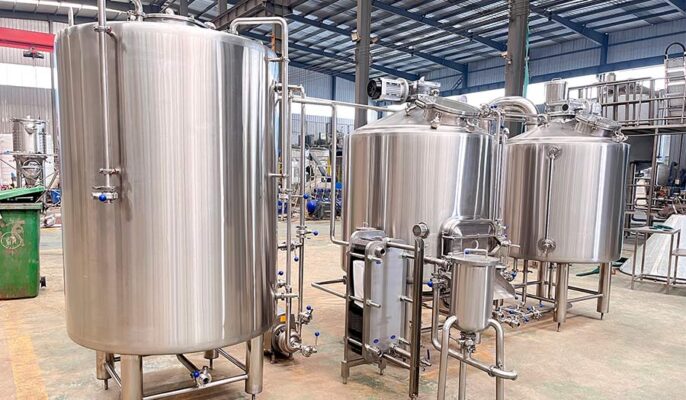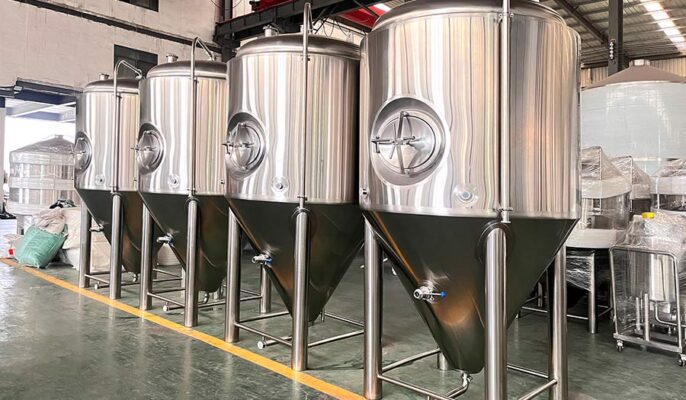Breweries vary in size, and so do brewing equipment costs, with their operations, costs, and revenue determined by their size. Despite the difference in size, the basic brewing process for beer brewing is the same. If you’re considering building a brewery, check out this guide from us to help you better understand brewing equipment costs.
醸造設備費用
醸造設備のコストは、醸造所の規模、醸造システムのタイプ、必要な特定のコンポーネントなど、さまざまな要因によって異なります。ここでは、様々なタイプの商業醸造システムのコストの一般的な内訳を示します:
- ナノ醸造所(1~3バレル):$10,000~$50,000ナノ醸造所は小規模で、年間生産量は1,000バレル未満。これらのシステムは、初期費用が安いため、新興企業やブルーパブに人気のある選択肢です。
- 小規模醸造所(5~15樽):$50,000~$200,000 年間1,000~15,000バレルを生産する小規模醸造所。これらのシステムは、製品を流通させる中小の独立醸造所で人気があります。
- 地域ビール醸造所:(15から60バレル):$200,000~$1,000,000地域ビール醸造所は、年間15,000~500,000バレルという大量のビールを生産している。これらのシステムはより複雑で、より大きな投資を必要とする。
- 大規模醸造所(60樽以上):$1,000,000以上 大規模ビール醸造所では、年間50万バレルを超える大量のビールが生産される。これらのシステムは、その規模、技術、自動化の程度にもよりますが、数百万ドルかかることもあります。
これらの費用は大まかな見積もりであり、選択する特定の機器やコンポーネント、カスタマイズ、送料などによって異なります。そのため、醸造機器メーカーと協力して、特定のニーズや要件に基づいた正確な見積もりを得ることが不可欠です。

どのような要因が影響するか 醸造設備 コスト?
規模の大小にかかわらず、すべての醸造所は醸造設備のコストを見積もらなければならない。
醸造設備資材
醸造設備はさまざまな素材で作られており、最も一般的な醸造釜は銅製とステンレス製である。
- 銅製の醸造設備醸造設備は銅製で、特に麦汁を沸騰させる釜は銅製である。銅鉱石を入手し、製錬して純粋な形にします。麦汁を沸騰させるために高温が必要だったため、人々は銅製の容器でビールを醸造し始めた。
- Stainless steel brewery equipment: In our modern world where everything is end product centric, all large commercial breweries in modern times use stainless steel brewery equipment. While the kettles used there are not made of stainless steel, they do have copper cladding on each kettle to ensure a traditional look but won’t affect the taste unless it’s bleached.
ステンレススチールは化学薬品には反応しませんが、塩素には反応しやすいので、適切な除菌処理を行えば、ステンレススチールの醸造設備で製造したビールの品質に影響を与えることはありません。さらに、ステンレススチールは銅よりも強い素材なので、麦汁を高温で煮沸してもストレスがかかりません。ステンレススチールは高価ですが、醸造所にとっては耐久性のある選択肢となるでしょう。
新品または中古の醸造設備
The production cost of commercial brewery equipment also depends on whether you are purchasing new or used brewery equipment for your startup. Of course, new equipment will be more expensive than used equipment, but if the commercial brewing equipment you use is in good condition, it won’t affect your brewing at all (need to check before buying).
醸造所に必要な主な設備は以下の通り:
- ボイラー
- ケトル
- 発酵タンク
- 石油貯蔵タンク
- 樽
フィルター、冷却装置、瓶詰め機、冷蔵庫、清掃用具も、どんな規模の醸造所にも欠かせない設備だ。
醸造所の規模
ブリュワリーとは、ビールを醸造する会社やその工程で使用される建物を指す場合もあるが、醸造所が醸造の初期段階で必要とするすべての部品の総称でもある。醸造所の規模は、業務用醸造設備のコストを決定する大きな要因となります。大規模な操業を行う場合は、より大きな設備と醸造所が必要になります。醸造所には、マッシュミキサー、ホットリカー・タンク、ワールプール、沸騰釜、ローター・タンが装備される。通常、醸造所の容量は樽(bbl.)当社のように、顧客の需要に応じて樽の容量が異なる醸造所を製造している会社はさまざまです。醸造所の小売価格もサイズによって異なる。最も小さな醸造所の価格は約$50,000です。
砂糖入りマッシュ
最初の容器は、麦芽やその他の穀物をすりつぶし、麦汁を抽出するために使用される。二槽式醸造所の二槽目は、麦汁にホップやその他の原料を加え、できた混合物を煮沸するために使用される。その後、麦汁を沈殿させ、液体から固体粒子を分離する。

発酵槽
発酵槽は麦汁を貯蔵し、酵母は麦汁中の糖分をアルコールと二酸化炭素に変換する。これらの瓶は、後で使用する酵母を回収しやすくするために、底が細くなっている必要がある。ジャケット付きの発酵槽は、もろみの温度をよりコントロールすることができますが、価格も高くなります。micetは様々なサイズとタイプの発酵槽を製造しており、当社のエンジニアに相談することもできます。
イギリス戦車
発酵プロセスが完了すると、ビールはろ過され、二次発酵タンクまたはビールタンクと呼ばれる別のタンクにポンプで送られる。缶ビールは、ビールを瓶、缶、樽に移して飲む前に、さらに清澄化し、炭酸を加えることができる。また、缶から直接ビールを提供するブルーパブもある。
樽
瓶や缶にビールを移したとしても、醸造業者はビールを保管するために樽を必要とする。また、パブやレストランに樽生ビールを販売したり供給したり、ブルーパブで樽生ビールを提供することもできる。また、ビールの腐敗や風味の低下を防ぐため、樽の洗浄も必要です。小規模の醸造所であれば、ケグを手作業で洗浄しなくてもやっていけるかもしれませんが、大規模の醸造所では、ケグ洗浄機の効率の良さとコストの安さを好むでしょう。
醸造所開設の平均費用
醸造所の開業費用は、必要な醸造設備や原料の費用以外に、醸造所の種類、立地、醸造所の規模、生産能力、スタッフの必要性によっても異なります。また、ケータリングを提供するかどうかも、開業費用や運営費用に影響します。ビール醸造所の立ち上げにかかる費用は、平均して1TP450,000~1TP450,000です。マイクロブルワリーや非常に小規模なビジネスでも、少なくとも1TP4.5万円はかかります。より多様なクラフトビールを提供する大規模な醸造所の場合、立ち上げ費用は$200万にもなります。
醸造設備費用の見積もり
設備費用から醸造所の大きさ、建設費、ライセンスに至るまで、醸造所の運営にかかる費用は特定の運営によって異なる場合があります。投資価格を見積もる際には、醸造設備のコストを考慮することが重要です。多くの種類の設備から選択することができ、醸造設備の融資オプションもあるため、立ち上げから運営まで行うことができます。もちろん、micetに連絡すれば、プロのエンジニアが醸造所を計画し、カスタマイズしてくれる。




